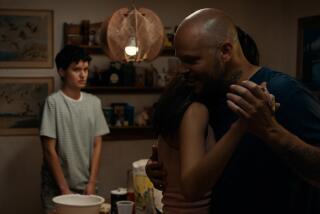A Month of Passing Seasons
- Share via
These are the seasons of our lives, from spring to summer and birth to death and the movement of the young toward maturity.
I’m seeing them all this June, which gives me pause to consider the transitions that mark our time toward the end on a day as bright as heaven and as lonely as virtue.
June seems to be that way because, I suppose, it’s a month of graduation and marriage, though the latter’s importance fades in an age where relationships replace romance and sex is the dominant factor in love.
I feel the change more so this year as I grow older on the edge of the passing parade, standing at a curb in the midst of the crowd, seeing what they see and perceiving what they miss.
The reason is because the parameters of the seasons bracket me like bookends, the howling emergence of life on one side, a silent dying on the other.
Up north, a friend yields to cancer, his talent and energy draining slowly into the broad sky, his mind fixed on the anxiety of where he’ll be the day after death.
Down here, another friend gives birth to twins and a new energy is thrust abruptly into the same sky, new rhythms into the pulse of life that stirs and cries in the minute after birth and demands to be heard.
And through this, between the bookends, my attention is focused on a little girl named Nicole who steps forward with a smile glowing through braces into a new world on a new day.
*
She is one of 43,000 students in L.A. moving from grammar school into middle school, a transition that marks a pathway from the sheltered rooms of infancy toward the scarier streets of adulthood.
I realize the interim nature of the passage at Nicole’s level and the distance she must still travel to achieve her goals. But middle school is critical to the maturation process of the young because it is here that the forces of pubescence forever alter their physiological makeup and nudge them, however gently, toward their destiny.
The sixth grade scared me when I was there. I wasn’t tall or handsome or athletic. Living in a broken home, I found myself seeking refuge in the quiet places of imagination, eventually putting words to the pictures in my head and turning despair into an obsession.
Middle school is a lonely time even for those who have what seems to be everything. One such golden boy was Teddy. He had looks, brains, popularity and a loving family, and there wasn’t a day I didn’t envy the very air he breathed.
I remember seeing him one day straddling a new bicycle, surrounded by the A-group of girls in class, as cool and easy with himself as a young person can be. It was the last time I saw him. That night, Teddy fashioned a noose around his neck, tied the other end to a beam across his ceiling and stepped into darkness from the upper bunk of his bed.
I had no family to answer questions, no counselors rushing to soothe my grief and fear, and the memory of Teddy continues to shape an uneasy view of what was then called junior high.
*
Nicole understands why poets seek corners but still manages to radiate a personality as sweet as a morning in spring. Imagination for now is at peace with personality. How this will fare in the white heat of transition remains to be seen.
I wish there were things I could tell her that would ease her walk up the high mountains and give her strength when a surge of effort is needed. I wish there were secrets I could impart that would unlock mysteries.
I think about this as we walk, her small hand in mine, up the back trails through the Santa Monicas, but I’m too tongue-tied to speak warnings, too unclear to offer coherent advice.
Her attention is on a hawk that soars high over the oak trees and on a lizard that scurries over a rock. She sings of nature, not transition, facing the distance in the wind that blows from the endless ocean, linked to sensory perceptions, avoiding what she can’t see.
Nicole’s parents are bright and loving people with a strong sense of responsibility and I have no cause to worry about her future. What I can give I give, and my job ends there.
But I know the loneliness of the young and I am aware of the dangers they face in a culture that trades on their vulnerability and abuses their innocence. The seasons they face hold thunder and high winds, lightning for them as it was for us.
I can only stand on the sidelines at a time of passages and grow old wishing them my strength, my love and the words I began writing a long time ago.
Al Martinez can be reached online at al.martinez@latimes.com


